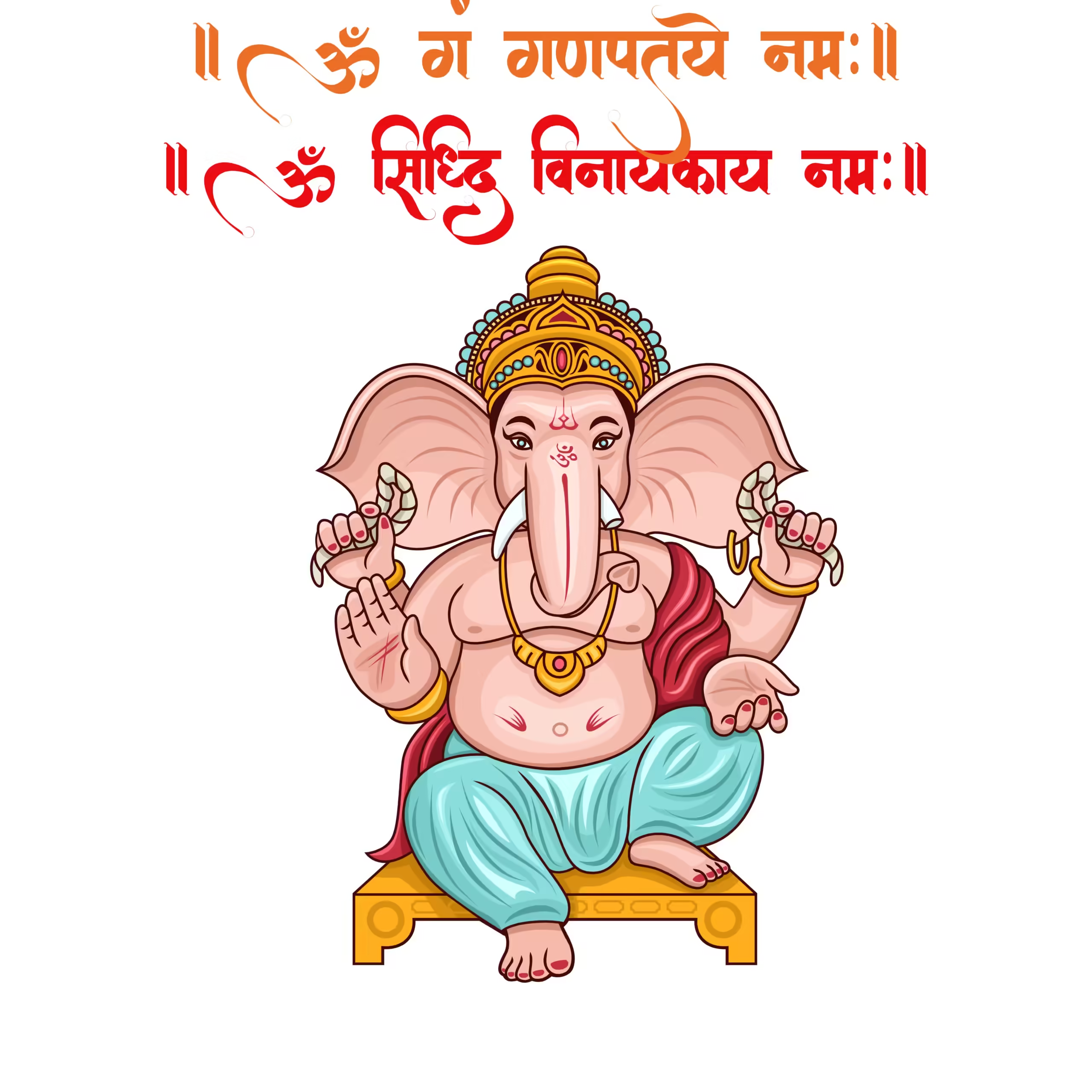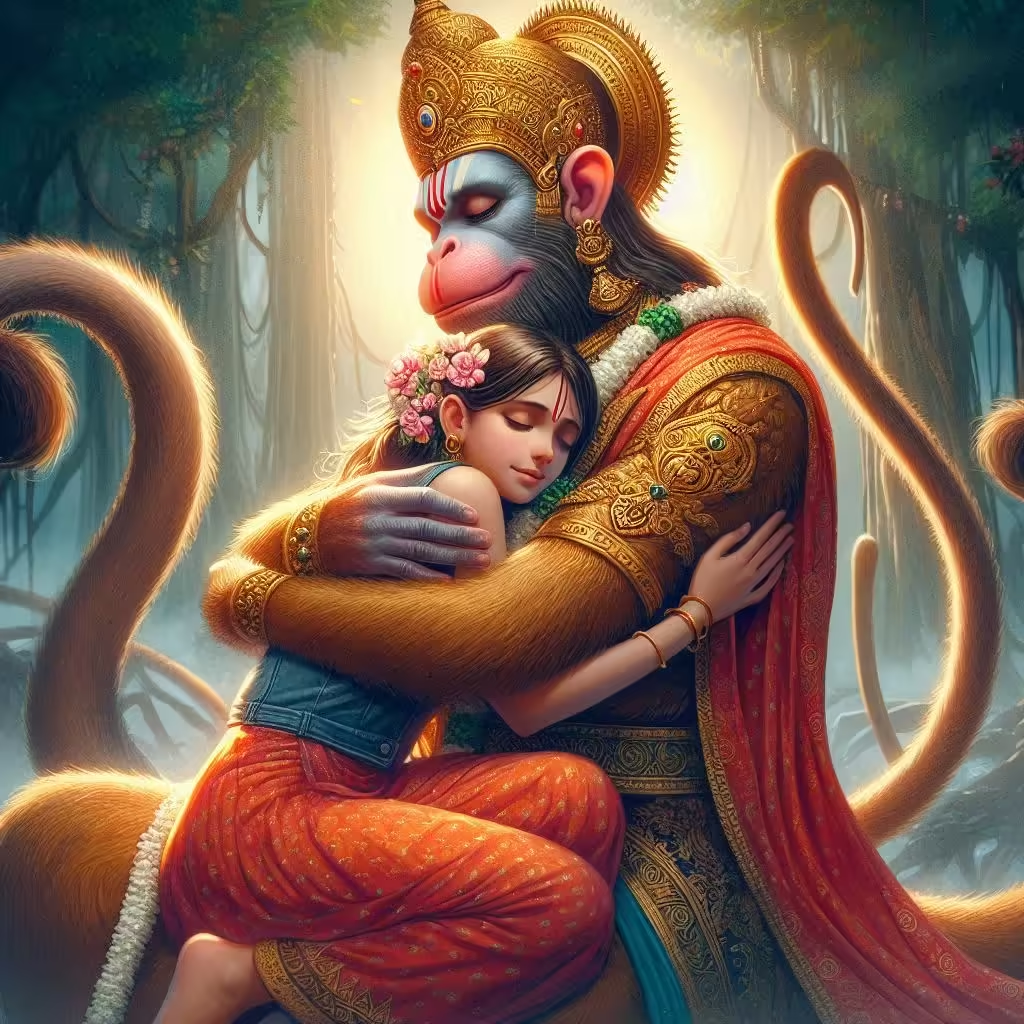Table of Contents
1. Introduction: Can you recite Hanuman Chalisa During Periods?
The Hanuman Chalisa is one of the most powerful and revered hymns in Hinduism, dedicated to Lord Hanuman, known for his devotion, strength, and courage. However, a common question that arises among women is, Can Hanuman Chalisa be recited during periods? This topic stirs up a mix of religious sentiments and societal taboos, making it a matter of personal and cultural significance.
Many people grow up with the belief that menstruating women should avoid religious activities, including the recitation of sacred texts like the Hanuman Chalisa. But how much of this is rooted in tradition, and how much is based on myths?
In this blog, we’ll explore whether it is appropriate to recite the Hanuman Chalisa during periods, when you should not read it, and uncover the reality behind these beliefs. By the end of this discussion, you’ll have a clearer understanding of this matter from both spiritual and cultural perspectives.
2. Understanding the Tradition: What Is Hanuman Chalisa?
The Hanuman Chalisa is a 40-verse hymn dedicated to Lord Hanuman, composed by the saint Tulsidas in the 16th century. Hanuman is known for his unwavering devotion to Lord Rama, symbolizing strength, courage, and humility. The Chalisa is often recited by devotees to seek Hanuman’s protection, strength, and blessings, especially in times of distress or challenges. Its verses are believed to remove negative influences and bring peace and well-being.
It’s recited daily by millions of people across the world, but questions arise on whether certain conditions, like menstruation, affect its spiritual effectiveness. In traditional Hindu households, many believe that a woman during her menstrual cycle is ritually impure and should avoid religious ceremonies, including the recitation of sacred texts like the Hanuman Chalisa.
The origins of this belief can be traced to ancient customs that linked menstruation with impurity, not just in Hinduism but in several other cultures around the world. However, these beliefs, though widespread, are largely social constructs and do not have solid theological backing.
While some Hindu scriptures discuss guidelines for cleanliness and purity, the interpretation varies widely across regions and families. Many modern practitioners argue that menstruation is a natural biological process and should not interfere with one’s spiritual practices.
3. Myth vs. Reality: When Should You Not Read Hanuman Chalisa?
One of the most common questions asked by devotees is, When should you not read Hanuman Chalisa? According to some traditional beliefs, there are a few situations where it is advised to refrain from reciting the Chalisa, including:
- During Menstruation: As mentioned, many households consider menstruation a time of impurity, advising women to avoid religious rituals. However, this is more of a social taboo rather than a strict religious mandate.
- During Mourning (Ashauch): Some traditions suggest that during a period of mourning or when there has been a death in the family, religious practices, including reading the Hanuman Chalisa, should be paused for a set number of days (usually 10 to 13 days).
- Without Cleanliness or Proper Mental State: Devotees are advised to maintain personal hygiene and a calm, focused mind when engaging in spiritual activities. If one is physically unclean or mentally distracted, it is thought that the spiritual benefit of reciting the Chalisa diminishes.
That being said, none of these stipulations are set in stone. Religious practices often vary based on individual interpretation, family traditions, and regional customs. For example, there are many religious scholars and spiritual leaders who strongly oppose the notion that women should not participate in religious rituals during their menstrual cycle.
In fact, Lord Hanuman’s qualities of unconditional love and acceptance suggest that he would not discriminate against anyone based on natural biological processes like menstruation. Devotion, after all, comes from the heart and is not contingent upon one’s physical state.
Moreover, there is no scripture explicitly forbidding the recitation of Hanuman Chalisa during menstruation. In many cases, the decision of whether or not to recite the Chalisa during periods is a personal one, influenced by how a person views their relationship with God, rather than strict religious guidelines.
The question of whether you can recite the Hanuman Chalisa during periods opens up broader conversations around faith, tradition, and personal belief. While many believe that menstruating women should avoid certain religious practices, this is rooted in cultural taboos rather than strong theological evidence.
It’s important to recognize the difference between tradition and personal spirituality. As practices evolve with time, many women are finding empowerment in deciding for themselves when and how to engage in spiritual activities, free from age-old stigmas.
More reading : The Historical Context of Menstrual Taboos in Hinduism
4. Can We Chant Mantras During Periods? The Religious Perspective
The belief that women should not chant mantras during their menstrual cycles is one that varies across cultures, families, and religious interpretations. In Hinduism, this debate becomes especially prominent due to the strong association of menstruation with ritual impurity, a concept that has been deeply embedded in traditional customs. This is why many women ask, Can we chant mantras during periods?—a question that has no single, definitive answer.
Historical Context
In ancient Hindu texts, menstruation was often treated as a time for rest and seclusion, allowing women to recuperate. The concept of ritual purity tied to menstruation is not unique to Hinduism, as similar practices are found in other major religions like Judaism and Islam. While the roots of this practice are often seen in religious texts, the interpretation of these texts varies widely.
For instance, in many traditional households, menstruating women are discouraged from entering temples, performing daily prayers, or chanting mantras. This includes the recitation of Hanuman Chalisa and other sacred texts. The reason for this is often cited as ritual impurity; however, it’s crucial to differentiate between cultural traditions and scriptural mandates.
Spiritual Leaders’ Opinions
Many modern-day spiritual leaders and scholars argue that menstruation should not prevent a woman from chanting mantras or engaging in other religious activities. One important distinction made by several Hindu leaders is that devotion is a mental and emotional practice, not solely a physical one. Mantras, which are tools for focusing the mind and invoking divine energy, do not lose their power based on the physical state of the person chanting them.
Swami Vivekananda, a prominent figure in Hindu philosophy, emphasized that spirituality is far beyond bodily functions. According to him, the soul’s connection with the divine transcends the physical world, and therefore, chanting during menstruation should not be seen as impure or wrong.
Extra Reading: spiritual leaders’ viewpoints on menstruation and religious practice
Swami Vivekananda’s Teachings on Spirituality
Modern Hindu Perspectives on Menstruation and Devotion
Scriptural Evidence
While menstruation and religious practices are mentioned in some Hindu texts, such as the Vedas and Smritis, these references are often interpreted differently depending on the region and tradition. There is no direct ban in most sacred texts that explicitly forbids women from reciting mantras like the Hanuman Chalisa during their periods.
This growing awareness, combined with a shift toward a more inclusive spiritual practice, has led many women to continue their religious observances during menstruation, regardless of past taboos. In fact, a significant number of spiritual gurus have come out in support of breaking the stigma around menstruation in religious contexts, asserting that one’s spiritual practice should be about their devotion and intentions rather than societal constructs.
5. Reasons People Believe You Shouldn’t Recite Hanuman Chalisa During Periods
Despite the evolving understanding of spirituality, many still adhere to the belief that Hanuman Chalisa or other sacred texts should not be recited during menstruation. The reasons for this are largely rooted in cultural taboos, with some families or regions still holding firm to these age-old customs. Let’s explore some common reasons why this belief persists:
1. Menstruation as Impurity
The most widespread belief is that menstruation represents a form of impurity. According to this view, the act of menstruation is considered a physical impurity, which makes a woman temporarily unsuitable for engaging in spiritual practices like chanting or entering sacred spaces. This belief is not based on the core teachings of Hinduism but rather stems from ancient notions of cleanliness, where ritual purity was prioritized for certain religious acts.
It is important to note that the idea of purity in Hinduism is symbolic and has been applied not only to menstruation but to a variety of natural human conditions, including death, birth, and even eating certain foods. These customs were likely born out of health considerations, ensuring that women rest during their cycles. However, they were never meant to restrict devotion.
2. Family Traditions and Social Pressure
Another major reason for this belief is the stronghold of family traditions. In many Indian households, customs around menstruation are passed down from generation to generation. Elders often instruct younger women on how they should conduct themselves during this time, which includes abstaining from religious activities like reciting the Hanuman Chalisa.
For some women, going against these traditions might be seen as a form of disrespect toward their elders or family beliefs, even though modern interpretations of religious practices may differ. Social pressure within certain communities can also play a role in enforcing these traditional norms.
3. Lack of Scriptural Knowledge
The belief that menstruating women should not recite mantras or engage in religious rituals often stems from a lack of deep scriptural knowledge. Many people assume that these restrictions are mandated by holy texts, without investigating the actual scriptures for themselves.
As discussed earlier, most Hindu scriptures do not contain any explicit prohibition against women engaging in religious activities during menstruation. Instead, this is more of a social construct that has been propagated over time. Unfortunately, many people continue to follow these customs without fully understanding the context or meaning behind them.
6. Breaking the Stigma: Why You Can Recite Hanuman Chalisa Anytime
In modern society, many women and religious scholars are challenging these outdated notions surrounding menstruation and religious activities. The core belief behind this movement is that spirituality is a personal journey, and one’s connection to the divine should not be restricted by natural biological processes. Here’s why more people are breaking free from the stigma:
1. Personal Devotion Over Physical State
Devotion is an internal state of being. The act of reciting the Hanuman Chalisa or any other religious text is an expression of one’s love, respect, and connection to the divine. If we consider Lord Hanuman, he represents unconditional love and acceptance. It is unlikely that a deity would deny blessings or devotion simply because of a natural bodily function like menstruation.
The focus in spirituality has always been on the heart and mind rather than the physical body. Chanting mantras or reciting the Hanuman Chalisa during periods should not be viewed through the lens of impurity but rather as an opportunity for continued spiritual growth and connection.
2. Science and Menstruation
From a scientific perspective, menstruation is a normal biological function that signifies a healthy reproductive system. There is no scientific evidence suggesting that menstruation interferes with one’s ability to focus or engage in spiritual activities. On the contrary, chanting mantras like the Hanuman Chalisa can have a calming effect on the mind and body, especially during times of emotional or physical discomfort, such as menstruation.
By incorporating scientific knowledge into our understanding of religious practices, we can begin to dismantle the taboos that have historically prevented women from engaging in religious life during their periods. The stigma is based on outdated ideas of cleanliness and purity, which no longer align with modern values or scientific facts.
Extra Reading : biological and psychological aspects of menstruation. Scientific View on Menstruation
3. Empowering Women in Spirituality
In recent years, there has been a strong movement toward empowering women to take ownership of their spiritual lives, free from restrictions based on gender or biological functions. Many women are now choosing to engage in religious activities like reciting the Hanuman Chalisa during their periods as an act of personal empowerment and devotion.
This shift in perspective is not about defying tradition for the sake of rebellion, but rather about understanding the true essence of spirituality: a deep, personal connection with the divine that transcends physical limitations.
Extra reading : Organizations advocating for gender inclusivity in religious practices. Example Link: Women’s Role in Modern Spiritual Practices
Conclusion: Respecting Faith While Understanding Personal Choices
The debate around whether one can recite the Hanuman Chalisa during periods is a reflection of the tension between ancient customs and modern spiritual understanding. While many still adhere to traditional views that discourage religious activities during menstruation, it’s important to remember that these beliefs often stem from social constructs rather than explicit religious mandates.
At the heart of the matter is the question of devotion. True spirituality is not determined by external circumstances, like physical cleanliness or societal norms, but by the purity of one’s heart and mind. Chanting the Hanuman Chalisa, or engaging in any other religious act, is a deeply personal expression of faith, devotion, and connection with the divine.
Lord Hanuman, to whom the Chalisa is dedicated, symbolizes unconditional love, strength, and acceptance. His teachings emphasize the importance of devotion and service, irrespective of one’s physical state. When we look at the qualities that Lord Hanuman embodies, it becomes clear that restrictions based on menstruation may not align with the spiritual essence of his message.
Breaking Free from Outdated Taboos
In today’s world, many women are choosing to break free from the stigma surrounding menstruation. They are embracing the idea that periods should not limit their participation in spiritual practices. This shift reflects a broader movement toward gender equality in religious spaces, encouraging women to make their own choices about how and when to engage with their faith.
By questioning long-held beliefs about ritual impurity, we can foster a more inclusive and empowering spiritual environment. Women should be free to connect with the divine whenever they feel called to, without feeling restricted by biological processes that are both natural and necessary.
Personal Choice and Respect for Tradition
That said, it’s important to acknowledge that spirituality is a deeply personal journey. For some, adhering to family traditions or religious customs during menstruation is a way of honoring their heritage and beliefs. Whether you choose to follow traditional guidelines or decide to continue your spiritual practices during menstruation, the key is to respect your personal choices and the choices of others.
If you feel comfortable and spiritually connected while reciting the Hanuman Chalisa during your period, there is no religious scripture that explicitly forbids it. On the other hand, if you prefer to abstain from religious activities during menstruation out of respect for family customs or personal comfort, that too is a valid choice.
Ultimately, spirituality is about your individual relationship with the divine, and this should be guided by your beliefs, intentions, and heart, rather than external expectations. As society evolves and the understanding of menstruation shifts, so too should our interpretation of its role in spiritual practice.
In conclusion, whether or not to recite the Hanuman Chalisa during menstruation is a personal decision. While tradition may discourage it, modern interpretations of spirituality empower women to make their own choices. As long as the intent is sincere and the heart is pure, the recitation of this sacred text can be a source of strength and peace, regardless of physical circumstances. The key is to follow your own spiritual path with integrity and devotion.
What do you think about chanting the Hanuman Chalisa during periods? Is it appropriate or respectful to engage in the Hanuman Chalisa during periods, or are there specific guidelines to consider? Share your thoughts on whether the Hanuman Chalisa during periods is a meaningful practice or if it holds different significance in this context.
If you’re intrigued by the Hanuman Chalisa and its significance, especially in contexts like “Hanuman Chalisa during periods,” you’ll definitely want to explore more on our site. Check out our post on how to download the Hanuman Chalisa in PDF format with big fonts for easy reading—it’s perfect for both new and seasoned practitioners.
You can find it here: Download Hanuman Chalisa PDF. Additionally, don’t miss our article on a powerful Hanuman mantra for protection that brings peace of mind.
It’s a valuable resource for anyone looking to enhance their spiritual practice and find inner tranquility, whether or not they’re considering the Hanuman Chalisa during periods. Read it here: Hanuman Mantra for Protection. These posts are packed with insights and practical tools to enrich your spiritual journey.



